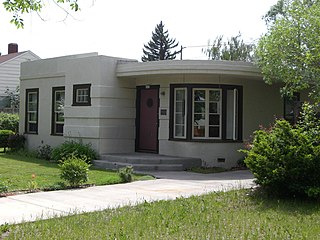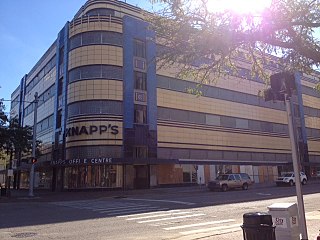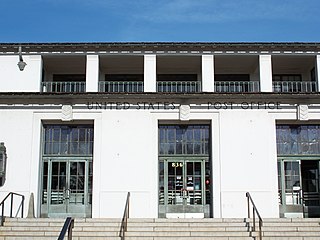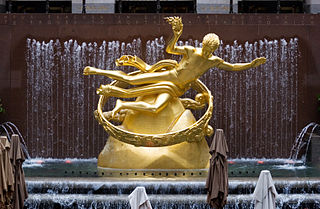
Miracle Mile is a neighborhood in the city of Los Angeles, California.

Streamline Moderne is an international style of Art Deco architecture and design that emerged in the 1930s. Inspired by aerodynamic design, it emphasized curving forms, long horizontal lines, and sometimes nautical elements. In industrial design, it was used in railroad locomotives, telephones, buses, appliances, and other devices to give the impression of sleekness and modernity.

Stiles Oliver Clements was an architect practicing in Los Angeles and Southern California.

The Miami Beach Architectural District is a U.S. historic district located in the South Beach neighborhood of Miami Beach, Florida. The area is well known as the district where Italian fashion designer Gianni Versace lived and was assassinated by Andrew Cunanan, in a mansion on Ocean Drive. It is bounded by the Atlantic Ocean to the east, Sixth Street to the south, Alton Road to the west and the Collins Canal and Dade Boulevard to the north. It contains 960 historic buildings.

Charmont Apartments is an historic five-story apartment building in Santa Monica, California which was built in 1928. Designed by architect Max Maltzman with elements of both the Mission Revival-Spanish Colonial Revival style and the Art Deco style, the Charmont was a luxurious high-rise when it was built. The blending of Spanish Colonial Revival and Art Deco elements was popular style in the 1920s and is sometimes known as "Med-Deco." The main entrance is located in a walled courtyard that features a two-tiered fountain with an intricate Moorish-patterned backsplash in polychrome tile.

The Daily Express Building, located on Great Ancoats Street, Manchester, England, is a Grade II* listed building which was designed by engineer Sir Owen Williams. It was built in 1939 to house one of three Daily Express offices; the other two similar buildings are located in London and Glasgow.

The Milton Odem House is a small bungalow home located in Redmond, Oregon. The house was built in 1937 by Ole K. Olson for Milton Odem, a local theater owner. It is one of the best examples of residential Streamline Moderne architecture in Oregon. The Milton Odem House was listed on the National Register of Historic Places in 1997.

The Beacon, known for many years as the Hotel Shangri-La, is a historic boutique hotel located at 1301 Ocean Avenue in Santa Monica, California. It is an example of Streamline Moderne architecture and Art Deco design.

The J.W. Knapp Company Building is a historic five-story, 190,000-square-foot (18,000 m2) Streamline Moderne building in Lansing, Michigan, United States. Designed by Orlie Munson of the Bowd–Munson Company, which also designed several other Art Deco landmarks in Lansing, including the Ottawa Street Power Station, it was constructed by the Christman Company in 1937 through 1938. The curvilinear look of the streamlined structure comes from huge plates of concrete faced with enamel, called "Maul Macotta", a copyrighted product of the Maul Macotta Company and prismatic glass brick windows. Alternating horizontal bands of yellow macotta and glass block are interrupted by vertical blue macotta pylons, rising from the building's four principal entrances. The pylons are pierced by windows. The entrance portals, display window aprons, and decorative banding are dark blue macotta. Red, yellow and blue spandrels, incorporating the letter "K" as a design element, decorate the entrance portals.

Moderne architecture, also sometimes referred to as Style Moderne or simply Moderne, Jazz Age, Moderne, Jazz Modern or Jazz style, describes certain styles of architecture popular from 1925 through the 1940s. It is closely related to Art Deco. Both belong to the architectural Modern Movement, which broke with tradition on purpose to create a fresh look that was uninfluenced by earlier forms and styles.

The U.S. Post Office in Santa Barbara, California is a combined post office-federal office building in Santa Barbara, California. The post office is a prominent example of Mission Revival-influenced Art Deco design and is a significant building in the historic core of Santa Barbara. It was designed by Pasadena architect Reginald Davis Johnson in the mid-1930s, and was completed in 1937. The building retains a high degree of architectural integrity, with minimal changes to the interior and no changes to the exterior, which retains its original landscaping.

Rosenberg's Department Store is located at Fourth and D Streets in downtown Santa Rosa, California. The structure is the most significant example of the Streamline Moderne style in Santa Rosa, and was the tallest building in the city for many years.

The Hollywood Theater is a historic theater building in Minneapolis which is listed on the U.S. National Register of Historic Places. It is located in the Audubon Park neighborhood of Minneapolis.

The Art Deco style, which originated in France just before World War I, had an important impact on architecture and design in the United States in the 1920s and 1930s. The most notable examples are the skyscrapers of New York City, including the Empire State Building, Chrysler Building, and Rockefeller Center. It combined modern aesthetics, fine craftsmanship, and expensive materials, and became the symbol of luxury and modernity. While rarely used in residences, it was frequently used for office buildings, government buildings, train stations, movie theaters, diners and department stores. It also was frequently used in furniture, and in the design of automobiles, ocean liners, and everyday objects such as toasters and radio sets.
The Nethercutt-Richards family is a prominent American family in the fields of business and cars. The family originated from the Midwestern U.S. in the 19th century and made their fortune primarily from the cosmetics industry in the early 20th century.

The Merle Norman House is an historic ocean view estate built for cosmetics magnate Merle Norman located at 2523 Third Street in Santa Monica, California. It was constructed during the Great Depression in 1935 with a mix of Mediterranean Revival and Art Deco designed by architect Ellis G. Martin.
















